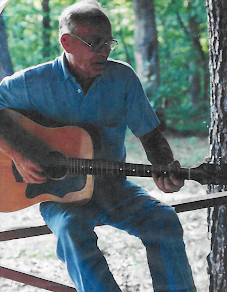From Linda Lee Greene, Author/Artist
The one-room, Cedar Fork schoolhouse across the holler from the little log cabin on the near side of Peach Mountain was a tolerable two-mile walk-in good weather. It was an enjoyable walk actually, if one had time to swing from a grapevine on top of a high cliff and drop into Cedar Fork Creek for a lazy dip or stop by the Workman’s place for a quick smoke of their cornsilk tobacco. But in snowdrifts as tall as thirteen-year-old, Lee Greene, in threadbare clothes, thin hand-me-down coat, and barely covered feet in holey socks flopping in an old pair of secondhand shoes that were several sizes too big for him, the walk that frigid morning was worse than pure misery.
Lee’s chronically aching stomach was hollow and rumbling. His meager breakfast of cornmeal mush and sugar water was quickly wearing thin, but he had more important things than his stomach to worry about that morning. He was stewing about the paucity of milk he had drawn from his family’s cow tethered in the yard just beyond the lean-to kitchen at the back of their tiny log cabin. The two-story structure, built by Lee, his older brother, Bill and their father only five months before, comprised a common, or front room, on the main level, a primitive lean-to kitchen at the back, and a bedroom where his parents slept. The room housed the only closet in the place. A rough-hewn timber ladder gained access to the upper deck, where, in an open-to-the-front loft, all the many children slept on crude cots, or thin pads on the floor. A large ceiling-to-floor fireplace of indigenous stones in the common room on the first floor was the only source of heat in the place. Felled tree trunks supporting its roof, a porch spanned the width of the front of the log cabin.
The soil on Cedar Fork, thin, hard, and dry, a crusty layer of sediment topping a bedrock of limestone, dolomite and shale, made for poor farming and gardening, posing a formidable challenge for growing adequate crops. Squirrels, rabbits, opossums and birds, hunted and brought in by Lee and Bill, the insufficient supply of milk from the cow, and scant eggs supplied by their paltry flock of scrawny chickens in the yard, were the only sources of protein for the family. In season, a large vegetable garden and a stand of corn were coddled into fruition in the poor soil, but only if they were favored with enough rain.
His nose and eyes crusty from yet another head cold, gloveless hands thrust into the pockets of his thin coat, and his feet turning to blocks of ice, Lee trudged on to school, his white-blond head under his hat hunkered into his shoulders. Despite the fact that he might not make it through the perpetual hardships of his life, much less that cold, windy, and snowbound morning, his soul was full of dreams, his mind of intention, his body of vigor and endurance, and on the strength of pure power of will alone, and maybe some help from the man upstairs, Lee was determined that if he got out of his childhood alive, nothing would ever encumber him again.
The schoolhouse was dark and frigid, and Lee, by design, was the first student to arrive. The door was unlocked as it always was, and Lee, halting for a few minutes to give his blood a chance to circulate again in his frozen limbs and digits, sat down on one of the benches. He would have wept if he had allowed himself to seriously consider his unfortunate circumstances—but not Lee! No, not Lee! Not the boy/man who five years in the future would be my father. He had a chance to earn fifty cents that week, and every week for weeks to come, fifty cents for building a fire in the “Warm Morning” coal-burning, heating-stove each morning before school, and that was exactly what he was going to do.”
***
“Life is difficult,” renowned psychotherapist, M. Scott Peck states in his groundbreaking book, The Road Less Traveled. The above excerpt from Guardians and Other Angles, my novel that is based on the true story of my grandparents and parents and their immediate families illustrates that my father’s early life was a testament to Peck’s pronouncement. Born in the midst of the Great Depression, my dad was the third of twelve children. Few were the hours, or even minutes, of every day that were not devoted to details of survival: scouring for food, maintaining shelter, searching for work of any kind. Like millions of others among the “Greatest Generation,” the extreme difficulties of the times forced my father to grow up on his own, primarily. Through the perils and pitfalls of life as he encountered it, he survived and thrived, and in the process evolved into perhaps the most disciplined person I have ever known. Don’t get me wrong—my dad was a fun guy. Sharing a beer or fishing with a buddy or two was high on his agenda; he was a shark at Euchre; he knew a million jokes and delivered them like a pro; he played the guitar and sang with the best of them. But getting the job done always came before pleasure. Peck calls it “delaying gratification,” which is one of the essential tools in the development and maintenance of discipline. Growth absent a consistent basis of discipline sputters and then stalls sooner or later.
My father gave me many priceless gifts during his lifetime, legacies that have endured these many years since his passing. One of the greatest of them was his talent for discipline. I am not as good at it as he was, but I will die trying.
Guardians and Other Angels, multi-award-winning author Linda Lee Greene's novel, chronicles the story of two heroic families played out against the bad and the good of the early to mid-twentieth century, years of worldwide economic depression and war, as well as the spawning of the “Greatest Generation.” Firsthand accounts of the times in authentic letters written by members of the families are peppered throughout the book.
Available in paperback and in eBook on Amazon

Greene moved from farm-girl to city-girl; dance instructor to wife, mother, and homemaker; divorcee to single-working-mom and adult-college-student; and interior designer to multi-award-winning artist and author, essayist, and blogger. It was decades of challenging life experiences and debilitating, chronic illness that gave birth to her dormant flair for art and writing. Greene was three days shy of her fifty-seventh birthday when her creative spirit took a hold of her.
She found her way to
her lonely easel soon thereafter. Since then Greene has accepted commissions
and displayed her artwork in shows and galleries in and around the USA. She is
also a member of artist and writer associations.
Visit Linda on her blog and join her on Facebook. Linda loves to hear from readers so feel free to email her.



What a heartwarming, beautiful post! Thank you for sharing :)
ReplyDeleteThank you so much for your nice comment, Marina. xo
DeleteReading this affirms how lucky we are in this generation, and how much for granted we truly take. Hugs and thank you for sharing, Linda. All the best for an abundant and healthy holiday season. Cheers!
ReplyDeleteI do appreciate your generous comment, Sharon. I send you wishes for a wonderful holiday, too. xo
DeleteWhat a lovely story. Thanks for sharing.
ReplyDeleteThank you so much, Catherine. It was so nice of you to comment. xo
ReplyDeleteThank you so much for hosting me on your blog, Sloane Taylor. Rereading it brought a lump of loneliness in my throat for my wonderful father. xoxo
ReplyDelete